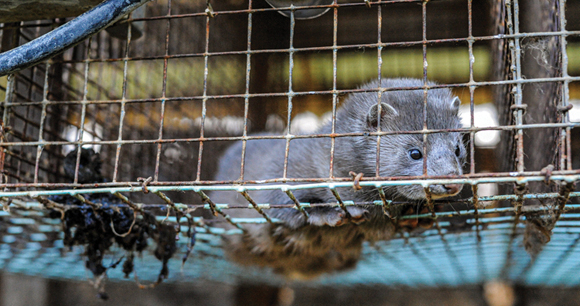
Washington, DC—Today, the Animal Welfare Institute (AWI), joined by 46 public health scientists, veterinarians, animal welfare and conservation organizations, and other experts in their respective fields, delivered a letter to leaders of the Agriculture Committees in the US House of Representatives and Senate expressing strong opposition to a provision in the House Farm Bill (H.R. 8467) that would earmark taxpayer dollars for the mink industry to develop and expand into international markets. Section 3201(d) of the bill seeks to repeal existing law and direct federal dollars to an overwhelmingly unpopular industry that poses a severe risk to public health.
“The intent of the 2024 Farm Bill is to achieve both fiscal responsibility and a commitment to improving the health and wellbeing of Americans—and Section 3201(d) is entirely counterproductive to these objectives,” the letter states. It was signed by organizations and experts in the fields of epidemiology, virology, medicine, veterinary science, fashion, wildlife conservation, and public policy, among others.
A growing body of science shows that mink are particularly high-risk “mixing vessels,” producing dangerous variants of respiratory diseases that are potentially transmissible to humans—including COVID-19 and H5N1, a deadly strain of avian influenza that is currently sweeping through US poultry flocks and dairy herds and has infected a number of humans. Leading scientists have thus concluded that mink fur farms—where mink are kept in close quarters and often unsanitary conditions—threaten to usher in the next pandemic.
“Congress is throwing good money at bad policy by proposing to further subsidize operations that are responsible for incubating diseases such as COVID-19 and avian influenza, creating the perfect conditions for new variants to jump to humans,” said Kate Dylewsky, AWI’s assistant director of government affairs. “This wasteful and shortsighted provision must be removed from the Farm Bill.”
Moreover, mink farming is an unpopular and dying industry, with sales nosediving even before the COVID-19 pandemic. According to the US Department of Agriculture, in 2017 there were 236 mink operations in the United States. Five years later, the number of US mink farms had dropped to 110. This decline is a direct result of shrinking consumer demand for real fur, and a commitment by major fashion brands and retailers to go fur-free, including Nordstrom, Macy’s, Bloomingdale’s, Saks Fifth Avenue, Gucci, Versace, and Giorgio Armani.
Marjorie Fishman, Animal Welfare Institute
[email protected], (202) 446-2128
The Animal Welfare Institute (awionline.org) is a nonprofit charitable organization founded in 1951 and dedicated to alleviating animal suffering caused by people. We seek to improve the welfare of animals everywhere: in agriculture, in commerce, in our homes and communities, in research, and in the wild. Follow us on Facebook, X (formerly Twitter), and Instagram for updates and other important animal protection news.